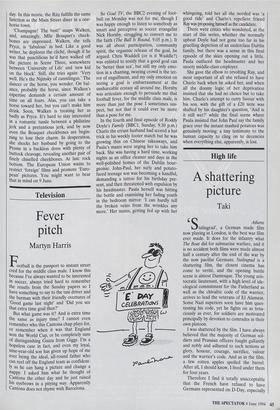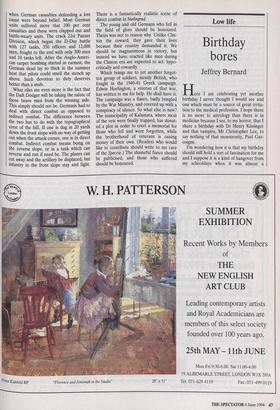High life
A shattering picture
Taki
Athens talingrad', a German made film now playing in London, is the best war film ever made. It does for the infantry what The Boat did for submarine warfare, and it is no accident both films were made almost half a century after the end of the war by the now pacifist Germans. Stalingrad is a shattering film, the closest cinema has come to verite, and the opening battle scene is almost Dantesque. The young aris- tocratic lieutenant, with a high level of ide- ological commitment for the Fatherland as well as the chivalric code of the warrior, arrives to lead the veterans of El Alamein. Some Nazi superiors soon have him ques- tioning his code, yet he fights on as tena- ciously as ever, for soldiers are motivated principally by devotion to comrades in their own platoon.
I was shattered by the film. I have always believed that the majority of German sol- diers and Prussian officers fought gallantly and nobly and adhered to such notions as glory, honour, courage, sacrifice, valour and the warrior's code. And as in the film, a few rotten apples spoiled the barrel. After all, I should know, I lived under them for four years.
Therefore I find it totally unacceptable that the French have refused to have Germans represented on D-Day, especially when German casualties defending a lost cause were beyond belief. Most German units suffered more that 100 per cent casualties and these were clapped out and battle-weary units. The crack 21st Panzer Division, which began the D-Day battle with 127 tanks, 350 officers and 12,000 men, fought to the end with only 300 men and 10 tanks left. After the Anglo-Ameri- can carpet bombing started in earnest, the German dead lay so thick in the summer heat that pilots could smell the stench up above. Such devotion to duty deserves better than a snub.
What riles me even more is the fact that the Daft Dodger will be taking the salute of those brave men from the winning side. This simply should not be. Germans had to deal with direct combat as opposed to indirect combat. The difference between the two has to do with the topographical crest of the hill. If one is dug in 20 yards down the front slope with no way of getting out when the attack comes, one is in direct combat. Indirect combat means being on the reverse slope, or in a tank which can reverse and run if need be. The planes can cut away and the artillery be displaced, but infantry in the front slope stay and fight. There is a fantastically realistic scene of direct combat in Stalingrad.
The young and old Germans who fell in the field of glory should be honoured. Theirs was not to reason why. Unlike Clin- ton the coward, they gave their lives because their country demanded it. We should be magnanimous in victory, but instead we have reacted like men during the Clinton era are expected to act: hypo- critically and cowardly.
Which brings me to yet another forgot- ten group of soldiers, mostly British, who fought in the 1940-41 Greek campaign. Edwin Horlington, a veteran of that war, has written to me for help. He shall have it. The campaign -was a fiasco, badly bungled by the War Ministry, and covered up with a conspiracy of silence. So what else is new? The municipality of Kalamata, where most of the vets were finally trapped, has donat- ed a plot in order to erect a memorial for those who fell and were forgotten, while the brotherhood of veterans is raising money of their own. (Readers who would like to contribute should write to me care of the Speccie.) The shameful fiasco should be publicised, and those who suffered should be honoured.



























































 Previous page
Previous page